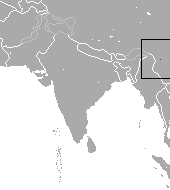
In the epic Mahabharata, Ambika is the daughter of Kashya, the King of Kashi, and wife of Vichitravirya, the King of Hastinapur.

In the epic Mahabharata, Ambalika is the daughter of Kashya, the King of Kashi, and wife of Vichitravirya, the King of Hastinapur.

Kripa, also known as Kripacharya, is a figure in Hindu scripture. According to the epic Mahabharata, he was a council member of Kuru Kingdom and a teacher of the Pandava and Kaurava princes.

The Harivamsha also known as the Harivamsha Purana, is an important work of Sanskrit literature, containing 16,374 shlokas, mostly in anustubh metre. This text is considered to be a khila to the Mahabharata and is traditionally ascribed to Vyasa. The most celebrated commentary of the Mahabharata by Neelakantha Chaturdhara, the Bharata Bhava Deepa also covers the Harivamsa. According to a traditional version of the Mahabharata, the Harivamsa is divided into two parvas (books) and 12,000 verses. The Critical Edition has three parvas and 5,965 verses.
List of the avatars of great epic Mahābhārata and the original devatas or deities whose avatars/portion they were.
The Adi Parva or The Book of the Beginning is the first of eighteen books of the Mahabharata. "Adi" is a Sanskrit word that means "first".

Sabha Parva, also called the "Book of the Assembly Hall", is the second of eighteen books of Mahabharata. Sabha Parva traditionally has 10 sub-books and 81 chapters. The critical edition of Sabha Parva has 9 sub-books and 72 chapters.
Banksia densa var. parva is a variety of Banksia densa. It was known as Dryandra conferta var. parva until 2007, when Austin Mast and Kevin Thiele sunk all Dryandra into Banksia. Since there was already a Banksia named Banksia conferta, Mast and Thiele had to choose a new specific epithet for D. conferta and hence for this variety of it. As with other members of Banksia ser. Dryandra, it is endemic to the South West Botanical Province of Western Australia.

The Vana Parva, also known as the "Book of the Forest", is the third of eighteen parvas in the Indian epic Mahabharata. Aranya Parva traditionally has 21 sub-books and 324 chapters. The critical edition of Aranya Parva is the longest of the 18 books in the epic, containing 16 sub-books and 299 chapters.

Virata Parva, also known as the “Book of Virata”, is the fourth of eighteen books of the Indian Epic Mahabharata. Virata Parva traditionally has 4 sub-books and 72 chapters. The critical edition of Virata Parva has 4 sub-books and 67 chapters.

The Shalya Parva, or the Book of Shalya, is the ninth of eighteen books of the Indian epic Mahabharata. Shalya Parva traditionally has 4 sub-books and 65 chapters. The critical edition of Shalya Parva has 4 sub-books and 64 chapters.

The Karna Parva, or the Book of Karna, is the eighth of eighteen books of the Indian Epic Mahabharata. Karna Parva traditionally has 96 chapters. The critical edition of Karna Parv has 69 chapters

The pygmy brown-toothed shrew is a species of shrew in the order Eulipotyphla. It is distributed in China. C. parva was initially thought to be the same as Chodsigoa lamula, but it was found to be a separate species.

Linstead Parva is a small village and civil parish in the East Suffolk district of Suffolk in eastern England. It has a small but notable 13th-century parish church, still in regular use. The village pub, The Greyhound, was already established and trading when referenced in 1874, but it closed permanently in March 1955, and is now a private dwelling.

The Shanti Parva is the twelfth of eighteen books of the Indian Epic Mahabharata. It traditionally has 3 sub-books and 365 chapters. The critical edition has 3 sub-books and 353 chapters. It is the longest book among the eighteen books of the epic.

Anushasana Parva or the "Book of Instructions", is the thirteenth of eighteen books of the Indian Epic Mahabharata. It traditionally has 2 sub-books and 168 chapters. The critical edition has 2 sub-books and 154 chapters. Sometimes this parva is referred to as the "Book of Precepts".

Ashvamedhika Parva, is the fourteenth of eighteen books of the Indian Epic Mahabharata. It traditionally has 2 sub-books and 96 chapters. The critical edition has one sub-book and 92 chapters.

Svargarohana Parva or the Book of the Ascent to Heaven, is the last of eighteen books of the Indian epic Mahabharata. It traditionally has 6 chapters. The critical edition has 5 chapters. It is one of the shortest books in the Mahabharata.

The Stri Parva, or the "Book of the Women," is the eleventh of eighteen books of the Indian Epic Mahabharata. It traditionally has 4 sub-books and 27 chapters, as does the critical edition.
Apomempsoides trispinosa is a species of beetle in the family Cerambycidae. It was described by Karl Jordan in 1894, originally under the genus of Apomempsis.














